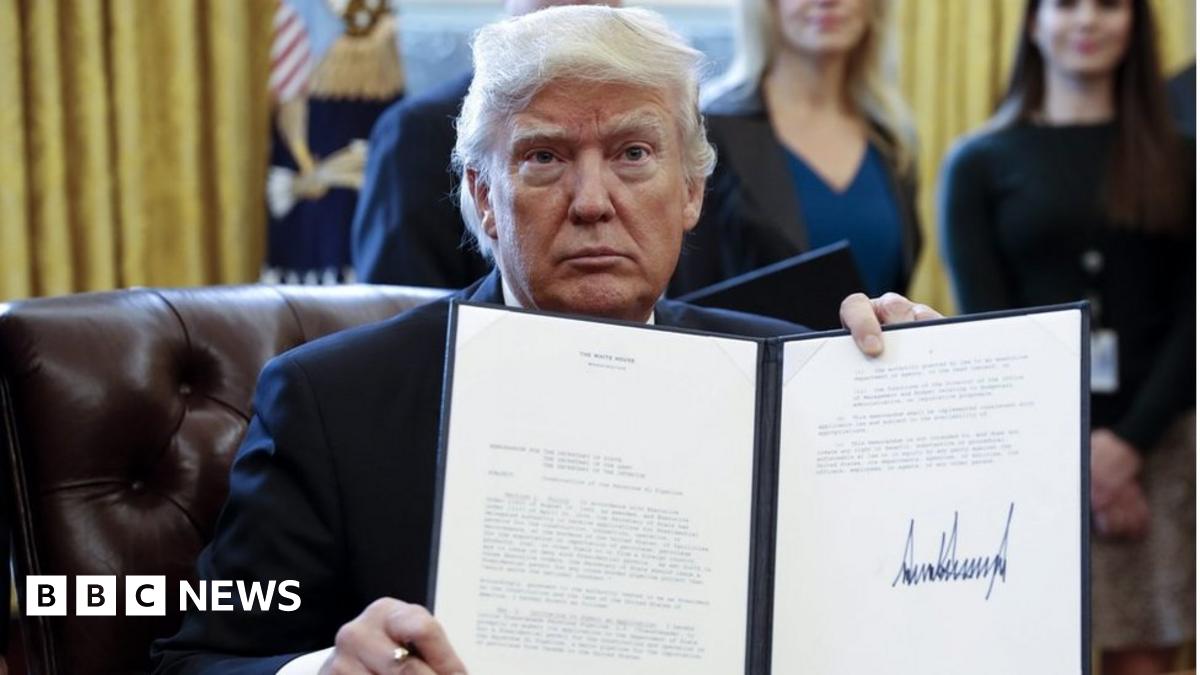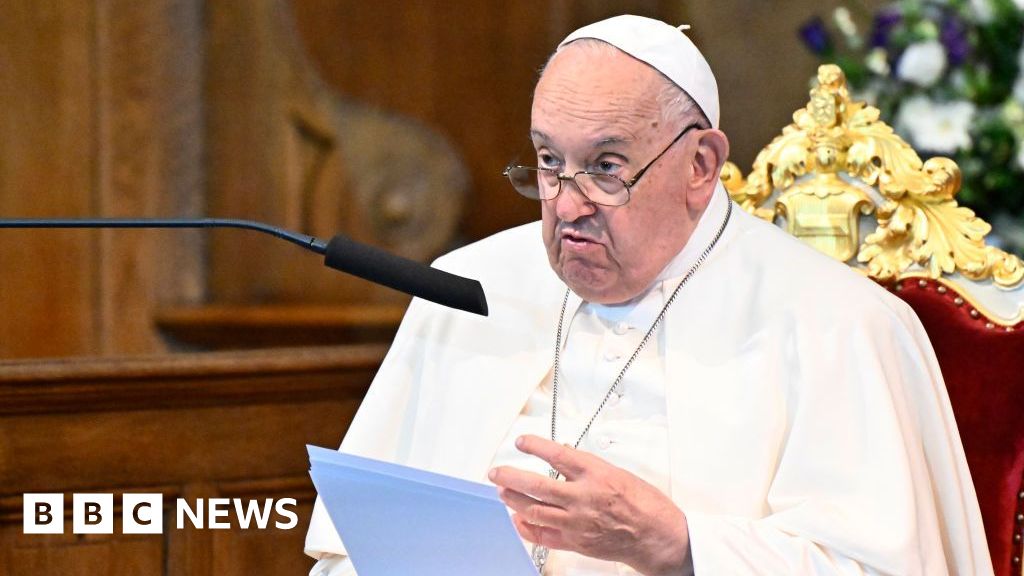ARTICLE AD BOX
By Joel Gunter
in Lviv, Ukraine
The scene in Melitopol. "We have not stopped protesting," one resident said.
In the southern city Ukrainian city of Melitopol on Monday, the mayor Ivan Federov sat down at his desk to send out his daily Facebook update.
He told his followers that the Russians forces occupying the city had now taken control of the city's communications network, so they needed be wary of what they heard on TV and the radio.
How many people would see his warning, he didn't know. Melitopol's internet connection had also all but disappeared, making it nearly impossible to reach people inside by WhatsApp or Telegram call, or stay connected for more than a few minutes.
The ordinary phone lines were no longer an option, Federov told the BBC, when the Telegram app finally connected. "We cannot use," he said. "Too easy for the Russians to listen in."
When the invading forces took control of Melitopol a week ago they ransacked the mayor's offices, Federov said, exiling his team to another location where they are attempting to continue running their city.
"We are not co-operating with the Russians in any way," Federov said emphatically. "They have not tried to help us, they cannot help us, and we do not want their help."
The Russian president, Vladimir Putin, has claimed he is invading Ukraine to liberate historically Russian lands and speakers from a Nazi regime. But in Melitopol and a string of other mainly-Russian speaking southern and eastern cities, his forces have found themselves treated as occupiers.
Image source, Reuters
Image caption,Russian military vehicles are seen on the street in Kherson, south-eastern Ukraine
"There are protests in Melitopol every day," said Yuliya Kovaliova, 33, who before the invasion helped run her family business of electronics stores.
"At some point the Russian army started shooting at us and one man got shot but we have not stopped protesting," Kovaliova said. "We are not afraid to protest because we are together. We are afraid to walk alone at night, but we are not afraid to protest."
About 5,000 people gathered in Melitopol's central square on Tuesday, Federov reckoned, despite the shooting last week, which wounded a man in the leg. Videos have surfaced showing protests in occupied and part-occupied cities and towns across the region - Kherson, Berdyansk, Starobilsk, Novopskov. The BBC reached residents and local mayors to try to understand the situation inside.
"I don't know how to count the number of people protesting, I thought it was 2,000 at least," said Yunona, a 29-year-old IT worker in the southern city of Kherson. "One of our friends was beaten and taken by the Russian soldiers and people got so angry they chased the occupiers down the street and took him back."
The Russian troops in Kherson looked young and uncertain, said Olha, a 63-year-old English teacher. "We go to the protests every day and they are close to us but they look afraid," she said. "We are all just waiting for the Ukrainian army to kick them out."
Image source, Reuters
Image caption,Berdyansk in the south-east has also seen protestors take to the streets
Reports of serious violence against Ukrainian protesters have been limited, for the most part Russian forces seem to be tensely watching. But some local mayors were facing a dilemma - how much to encourage their citizens to take to the streets.
"Our people need to protest but they also need to save their lives," said Federov, the Melitopol mayor. "I have asked them - please do not go near the Russian soldiers, go around them."
Vadym Gaev, the mayor of Novopskov, a town near Donbas, told the BBC there had been daily protests but they had stopped three days ago when Russian soldiers shot three protestors - non-fatally - and beat another. Gaev said the Russian troops told an intermediary they had authorisation to shoot protesters, so there should be no more protests.
Novopskov appeared to be an example of a strange and uneasy scenario playing out in some parts of Ukraine, where local Ukrainian officials were continuing to function in some form but Russian military forces were in control. In the occupied city of Starobilsk, nearby, mayor Yana Litvinova was also working remotely, she said.
"A new 'administration' has been appointed. The only thing we know is that it is going around government buildings and asking people to co-operate, and they are refusing."
President Zelensky: We will not give up, and we will not lose.
Gaev and his team left town when Russia seized Novopskov, in order to keep his administration running - a move he said had divided residents, some of whom accused him of a betrayal while others said they were grateful he was still able to work.
Two residents of Kherson told the BBC they thought the mayor there had betrayed the city by co-operating with Russian forces - an accusation circulating in Telegram chat groups. Two others said he was simply doing what he could to ensure the city kept running.
The mayor of Kherson, Igor Kolykhayev, told the BBC: "If I had betrayed the city would I still be here? I am in the office every day, working with my team to keep things running."
The priority was to restart food production and get people back to work, Kolykhayev said.
"We are running out of food and there is no aid coming in, it's just not happening," he said. "So we are telling everyone in the city: make any food you can make, manufacture anything you can manufacture."
War in Ukraine: More coverage
Most residents who spoke to the BBC from the occupied cities said food was fast running out.
"Shops are almost empty. You can buy the things that are left but very few things are left," said Yuliya Kovaliova, the electronics shop owner from Melitopol. "Pharmacies are empty and my mother can't buy her heart medicine."
Kovaliova said that two Russian trucks with humanitarian markings came into the city centre last week and attempted to hand out food, but they also brought a film crew. Nearly everyone refused, she said.
"Later we saw on it on TV. Russia has taken over the TV towers here so we only have one Russian channel being shown now and it was showing people taking the food and saying how thankful they are to the Russian humanitarian convoy."
Maxim, a 22-year-old piano teacher in the city, also described the supposed humanitarian convoy. "They were filming and people said actors arrived to take the food," he said. Yunona, the IT worker in Kherson, said she saw the same thing there, and Ukrainian media reported on the phenomenon in Berdyansk.
Ivan Federov, the mayor of Melitopol, said he had heard about these 'humanitarian convoys' too. But there were "no real Russian trucks and no real Russian food," he said.
"They could open humanitarian corridors at any time to allow food and medicine in, but they do not want to. We know, we have tried."
On Tuesday afternoon, as usual, Federov put out his daily Facebook update, appealing to anyone in the city who could afford it to pay their utility bills and congratulating Ukraine's women on International Women's Day. "I'm sure the war will end soon and we will celebrate all our holidays in a peaceful, Ukrainian Melitopol," he said.

 2 years ago
39
2 years ago
39








 English (US) ·
English (US) ·